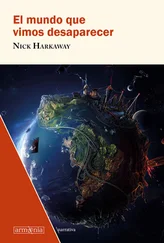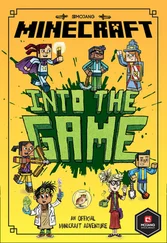Nick Harkaway - The Gone-Away World
Здесь есть возможность читать онлайн «Nick Harkaway - The Gone-Away World» весь текст электронной книги совершенно бесплатно (целиком полную версию без сокращений). В некоторых случаях можно слушать аудио, скачать через торрент в формате fb2 и присутствует краткое содержание. Жанр: Фантастика и фэнтези, Фэнтези, на английском языке. Описание произведения, (предисловие) а так же отзывы посетителей доступны на портале библиотеки ЛибКат.
- Название:The Gone-Away World
- Автор:
- Жанр:
- Год:неизвестен
- ISBN:нет данных
- Рейтинг книги:4 / 5. Голосов: 1
-
Избранное:Добавить в избранное
- Отзывы:
-
Ваша оценка:
- 80
- 1
- 2
- 3
- 4
- 5
The Gone-Away World: краткое содержание, описание и аннотация
Предлагаем к чтению аннотацию, описание, краткое содержание или предисловие (зависит от того, что написал сам автор книги «The Gone-Away World»). Если вы не нашли необходимую информацию о книге — напишите в комментариях, мы постараемся отыскать её.
The Gone-Away World — читать онлайн бесплатно полную книгу (весь текст) целиком
Ниже представлен текст книги, разбитый по страницам. Система сохранения места последней прочитанной страницы, позволяет с удобством читать онлайн бесплатно книгу «The Gone-Away World», без необходимости каждый раз заново искать на чём Вы остановились. Поставьте закладку, и сможете в любой момент перейти на страницу, на которой закончили чтение.
Интервал:
Закладка:
The house itself was no less wondrous. Through the wide wooden door, each room was a separate mystery wherein a young man might discover strange countries. The living room had a vaulted ceiling where—in the dusk—gargoyles could be seen flying from roost to roost. The den, used by both his father and his mother in the winter months for long, whiskied evenings in front of the black-tiled fireplace, was populated with gnomish metalworkers making legendary swords and lethal pikes. If he was good and quiet, and nimble when required, they had no objection to the tiny human child watching and learning as long as he swore (with hand on heart and one foot on an iron peg) never to reveal their ways. In the kitchen, between bags of taters and onions on a string, the stove whispered to his older self surprisingly accurate advice on romance, winning him willing compliance from a certain girl and surprising sensations hitherto unknown. This was a house of marvels.
In the third of the long, hot summers which the world endured around that time, the boy with the unfortunate name (his father was old Caspian Pestle, of Tennessee, and his mother a stick-like woman from the East, so far in that direction as to be near enough west, instead) came to man’s estate, and went out of his home town to make his way. He toiled as a soldier in a far-off jungle (this being the custom of his nation and his father’s people, and a noted part of the process of making a child into an adult fit to vote; sadly, it also stripped Humbert Pestle of a number of society’s preconceived notions of morality, as war is apt to do) and then as a student in a place of learning (this being a new necessity in the world just then). On returning, he found that his father had evicted his mother from the house on the grounds of his desire to install a newer replacement, and they fought. He informed his father that this was the action of a weasel, a phoney and a cheat. Caspian Pestle received this information without argument, even going as far as to add to the list the descriptions debaucher, Lothario and libertine. This recognition—coupled with an aggressive lack of repentance—drove Humbert into a fury. He discovered a moment later that he had struck Caspian Pestle backhanded. He did not recall doing so, but he found himself not unhappy with the decision. Leaning on the sofa which the child Humbert had envisaged as a pirate vessel, Caspian invited his son to depart. He did.
Humbert Pestle travelled, and joined a reputable firm, and worked to forget his irksome paternity. He found that while the old man faded rapidly from his mind, the house remained very much alive within him, and dreaming of it caused him considerable pain. He aged somewhat, and was promoted, fell in lust and out of it, fought in dojos and occasionally in bars and alleyways to assuage his anger, and grew bored and disenchanted with everything he had. And then, on a Monday in October—while I was struggling with university admissions—he chanced to encounter his mother’s brother, Mr. Eliard Rusth.
Mr. Rusth (to rhyme with must) was a small, densely constructed person with a bald head. He wore a long jacket and a short collar, and his eyes regarded the world through circular glasses. These gave him the look which snowmen acquire the day after their construction, of being partly dissolved and cavernous. He asked Humbert whether he wished to be a man of small consequence or whether he would care instead to play upon the grand stage, and Humbert Pestle replied that if he had a choice, his preference would be for the latter. Eliard Rusth said that he wasn’t here to talk about preferences. If preferences were all Humbert could offer, Eliard Rusth was in the wrong place and would now remove himself.
Humbert Pestle rephrased his reply in stronger terms.
Greatness, Eliard Rusth said, was not achieved by acting on one’s own account. Fortunes could be made that way; professions could be conquered. But greatness required that one set aside one’s own desires and become the instrument of destiny. And this, he explained, was the purpose of the Society of the Clockwork Hand. To be the instrument of destiny. The Clockwork Hand was a mechanism: once set in motion, it could not be stopped, not by time or force of arms or diplomacy. Members obeyed their instructions without question, whatever they might be, and the Master of the Hand, freed from all mundane considerations, listened in silence for the music of the great wheels of destiny.
A year later Humbert Pestle went by train and car to his father’s home, the house of marvels where he grew up, and burned it to the ground. As it transpired, the house was occupied, which Humbert Pestle, watching from the great lawn, came to realise only when he spied a figure limned in fire at one of the upper windows. (Opening a window in a burning building is inadvisable. This was immediately demonstrated quite practically, and the figure—male, elderly but still strong—was consumed entirely in a wreath of fire and fell from view.) Humbert Pestle, watching these events, had expected to find in himself a great tearing and commotion. Instead, he found that all his commotions were stilled. This was a thing so huge that it implied a hidden meaning. It was too vast to be anything but part of a huge and remarkable pattern. And as Humbert Pestle stared at the flames, he believed he could see the edges of that pattern. He could hear it moving. The sound was a measured beat, an endless whirring. It was not yet a piece of music, but he knew it would be in time.
In consequence of this enlightenment, Eliard Rusth shared with Humbert Pestle the Iron Skin Meditation and the more conventional gong fu of the Clockwork Hand (whose name itself derived from the perfect progress of the universe as if steered by a mechanical armature) so that his student’s experience as a commando was overlayed with a subtlety of technique and a terrifying endurance which allowed him, over the course of time, to advance within the Clockwork Hand to the position of Sigung, the most exalted of equals.
The ascent of Humbert Pestle to the leadership of the Clockwork Hand would not have been a catastrophe—save for a particular hereditary enemy of the Hand now eking out a living as a small-time instructor of the risible Voiceless Dragon style (whose tenets included a starkly discordant insistence on the value of a single human life) in a town almost too small for the name—had not the world suddenly collapsed upon itself in a great spasm and the lazy ascent towards unity come fundamentally unstuck.
The Go Away War and the Reification were a great chaos which brought an end to everything we knew. By accident or subconscious design, we destroyed the pattern of our lives, reduced our species to tiny pockets of survival and engendered a world whose very fabric responded to our thoughts. Humbert Pestle, silver at the temples and tough like a yew tree, survived the cataclysm but was appalled by the havoc that it wrought. Seeing in his mind the cogs of the great progress scattered willy-nilly all about, Pestle longed to put them back in the clockwork and make it run again. Nor was he alone. We all of us looked at the turmoil around and were afraid, and instead of going out to meet it and sniff it like good mammals, good primates, we got cold feet and fell back upon our cold blood; like lizards on a cloudy day, we wished ourselves back in the comfort of our holes; we wanted our finite horizons of predictable problems and predictable joys.
Humbert Pestle wandered through the chaos in despair. Discord was everywhere. The sense of destiny he had acquired in the Clockwork Hand was broken. And then one day he witnessed something which filled him with hope, something great and terrible, and Humbert Pestle looked at it and heard the first notes of the music he had been searching for. With that music sounding in his mind, he set about the creation of something great, around the remainder of the old financial system and the Society of the Clockwork Hand. He called it Jorgmund, and it would circle the world in its grip. The blood of Jorgmund was a thing called FOX, which could usher out the new and restore the old.
Читать дальшеИнтервал:
Закладка:
Похожие книги на «The Gone-Away World»
Представляем Вашему вниманию похожие книги на «The Gone-Away World» списком для выбора. Мы отобрали схожую по названию и смыслу литературу в надежде предоставить читателям больше вариантов отыскать новые, интересные, ещё непрочитанные произведения.
Обсуждение, отзывы о книге «The Gone-Away World» и просто собственные мнения читателей. Оставьте ваши комментарии, напишите, что Вы думаете о произведении, его смысле или главных героях. Укажите что конкретно понравилось, а что нет, и почему Вы так считаете.












